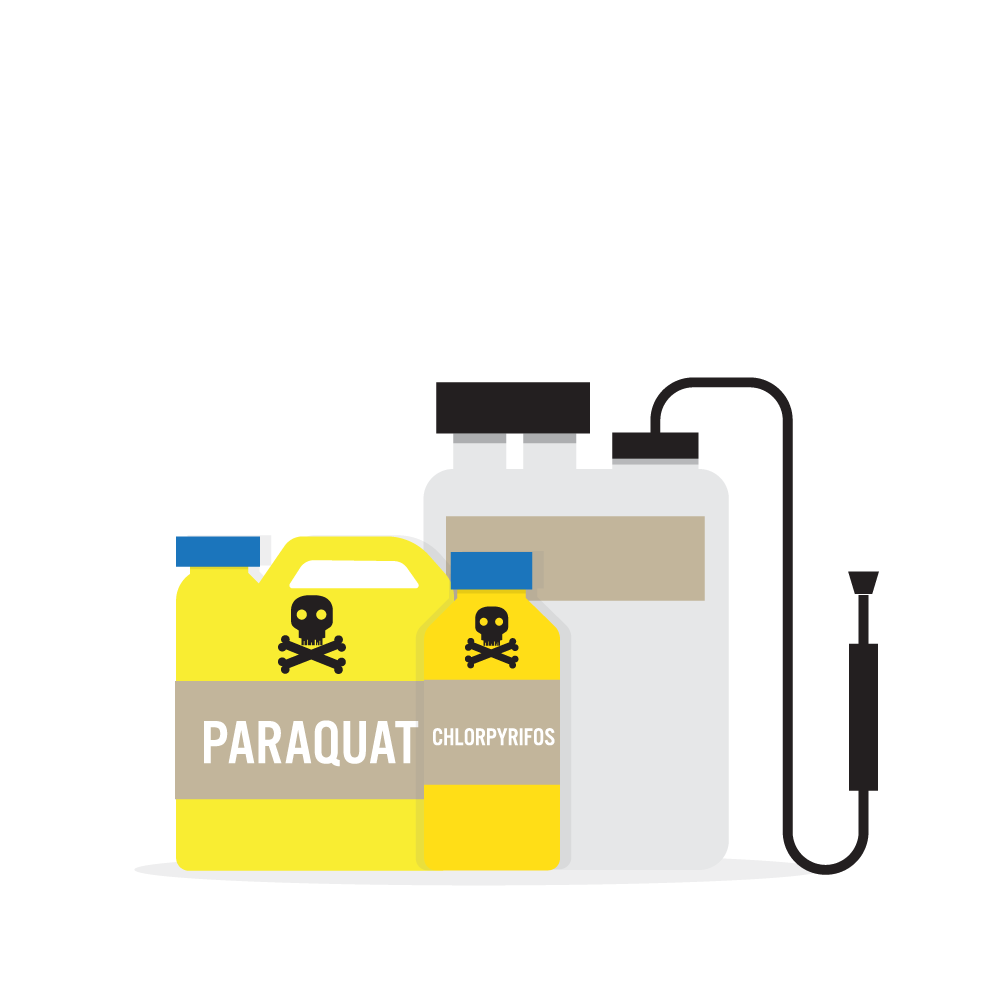Paraquat Pesticide
Parkinson's Lawsuit
Paraquat Lawsuit Case Evaluation
Paraquat Exposure Lawsuit For Those Diagnosed with Parkinson’s Disease or Parkinson's Motor Loss Symptoms
In recent years, scientific studies have provided strong evidence linking exposure to pesticides like paraquat to significantly increased risks of diseases such as Parkinson’s Disease and many forms of cancer.
Contact our experienced paraquat lawsuit attorneys today to learn more and to ensure you receive the financial compensation you deserve.
Have you or a loved one sprayed paraquat in an agricultural or commercial setting, and later developed Parkinson’s Disease or Suffered Motor Loss?
If your answer is yes, you may be entitled to participate in paraquat lawsuits currently being filed in courts throughout the U.S.

Which Paraquat Containing Products Qualify for the Parkinson's Disease Compensation Lawsuit?
- Paraquat Concentrate®
- Gramoxone®
- Ortho-Paraquat
- Blanco®
- Cyclone SL 2.0®
- Firestorm®
- Helmquat 3SL®
- Bonedry®
- Devour®
- Para-Shot 3.0®
Facts
A Particularly Toxic Herbicide
Although many herbicides have been linked to health risks and a variety of diseases, paraquat is considered “the deadliest pesticide on the market,” according to one agricultural health study, causing about 100 poisonings each year. Highly toxic to humans, one sip of paraquat can be fatal, resulting in death 70% of the time.
Due to its toxicity, the Environmental Protection Agency (EPA) has made paraquat a restricted use pesticide, which may only be used by certified and trained applicators. The Centers for Disease Control and Prevention (CDC) provides information and warnings about paraquat because it is “more toxic and presents a greater risk from exposure” than other pesticide products.
In addition to the immediate danger of poisoning, recent epidemiological studies have investigated the long-term health effects of paraquat on individuals exposed to the herbicide during the mixing, loading, and spraying of the product.
Responding to the weight of evidence demonstrating the severe public health dangers posed by paraquat, the EU, China, and Brazil, three of the largest agricultural producers in the world, are phasing out the use of paraquat or have banned the product entirely to protect the lives of farmers. By contrast, the United States has only taken some mitigation measures to control the immediate poisoning risks of paraquat, such as requiring warning labels, training, and safer packaging. Although these efforts may reduce the number of tragic accidents associated with paraquat, they do little to address the long-term dangers associated with low-level exposure to paraquat and the possibility that the herbicide is an environmental risk factor for Parkinson’s Disease.

What is Paraquat
and
How is it Used?
Paraquat dichloride, commonly known as “paraquat”, is a popular herbicide agent used widely throughout the U.S. to kill unwanted weeds. In recent years, paraquat use in the U.S. has significantly increased, as many crops have proven resistant to alternative herbicides.
Paraquat is sold by several herbicide manufacturers, most commonly as Paraquat Concentrate and Gramoxone, but also as Blanco, Cyclone SL 2.0, Syngenta, Firestorm, and several other brand names.
A Particularly Toxic Herbicide
Although many herbicides have been linked to health risks and a variety of diseases, paraquat is considered “the deadliest pesticide on the market,” according to one agricultural health study, causing about 100 poisonings each year. Highly toxic to humans, one sip of paraquat can be fatal, resulting in death 70% of the time.
Due to its toxicity, the Environmental Protection Agency (EPA) has made paraquat a restricted use pesticide, which may only be used by certified and trained applicators. The Centers for Disease Control and Prevention (CDC) provides information and warnings about paraquat because it is “more toxic and presents a greater risk from exposure” than other pesticide products.
In addition to the immediate danger of poisoning, recent epidemiological studies have investigated the long-term health effects of paraquat on individuals exposed to the herbicide during the mixing, loading, and spraying of the product.
Responding to the weight of evidence demonstrating the severe public health dangers posed by paraquat, the EU, China, and Brazil, three of the largest agricultural producers in the world, are phasing out the use of paraquat or have banned the product entirely to protect the lives of farmers. By contrast, the United States has only taken some mitigation measures to control the immediate poisoning risks of paraquat, such as requiring warning labels, training, and safer packaging. Although these efforts may reduce the number of tragic accidents associated with paraquat, they do little to address the long-term dangers associated with low-level exposure to paraquat and the possibility that the herbicide is an environmental risk factor for Parkinson’s Disease.
Parkinson’s Disease
Parkinson’s Disease is a degenerative brain disorder that causes tremors, rigidity, slow movements, impaired balance, and difficulties with walking. Over time, both motor and non-motor symptoms gradually worsen, making day-to-day life more difficult for those suffering from the disease and for their caregivers. Although both men and women can develop the disease, it affects about 50 percent more men than women. Parkinson’s Disease affects between 750,000 and 1 million Americans, and studies show that by 2030, an estimated 1.2 million Americans will be living with the disease.
Parkinson’s is caused by the degeneration of nerve cells in the substantia nigra, the part of the brain that controls movement. When these nerve cells die or become impaired, they produce fewer dopamine neurons, a critically important chemical compound that the nervous system uses to send messages between nerve cells. Without sufficient dopamine, the body’s balance is disrupted, leading to the slowness of movement problems that are the trademark symptoms of Parkinson’s Disease. There is currently no cure available for the disease.
Researchers still do not know the precise cause of Parkinson’s Disease, though genetic factors, accelerated aging, and the environment may all play a role. In recent years, scientific studies have connected the development of Parkinson’s Disease to environmental exposures, including frequency of exposure to pesticides like Paraquat.
Can Paraquat Exposure Cause Parkinsons Disease?
Over the last decade, scientists have achieved significant breakthroughs that demonstrate a clear link between exposure to Paraquat and the development of Parkinson’s Disease.
A 2011 study by the National Institute of Health (NIH), the Farming and Movement Evaluation (FAME) report, used data from the Agricultural Health Study to show that Paraquat users developed Parkinson’s disease approximately 2.5 times more frequently than others. In experimental models, paraquat causes oxidative stress, which is known to bring about the loss of dopaminergic neurons in brain cells associated with Parkinson’s Disease.
The FAME findings were supported by a 2014 study on Environmental Toxins and Parkinson’s Disease, which found that participants who had sprayed paraquat were twice as likely to develop Parkinson’s Disease than the general population.
In 2017, an additional study found a link between paraquat and Parkinson’s Disease, particularly in people with certain genetic traits. The major finding of the study showed that exposure to paraquat causes DNA damage and weakens mitochondrial respiration, which is likely to increase the incidence of Parkinson’s Disease.
Last year, responding to the EPA’s proposal to re-approve paraquat, fifty-two organizations representing farmers, public health and conservation advocates signed a letter urging the EPA to ban paraquat due to the serious risks it poses to farmworkers and those who live near farms where the pesticide is used. In recent months, the New York Times has highlighted the dangers and public health costs of paraquat, calling attention to studies that tie the chemical to the development of Parkinson’s Disease symptoms. At the same time, a new book written by some of the world’s top experts in Parkinson’s Disease studies identified exposure to paraquat as one of the key environmental risk factors for the disease and forcefully called upon the U.S. government to ban the pesticide.
Nevertheless, despite mounting evidence of the long-term dangers of paraquat to public safety, the EPA issued a Proposed Interim Decision in October 2020 that would re-approve paraquat for use with some mitigation measures. For the time being, the use of paraquat remains legal in the United States, although bills have been introduced in Congress seeking to end all paraquat sales and use in the country.
What are the Parkinson’s disease motor loss symptoms that someone might have after Paraquat exposure but not yet diagnosed with Parkinson’s disease?
- hand tremors
- prolonged or extreme stiffness
- difficulty with body movements
- loss of balance
- difficulty walking (slow gait, shuffling)
- difficulty or soft speaking
- reduced facial expression, blank stare
- drooling
- small handwriting
- trembling
- whole-body fatigue or dizziness
- amnesia or confusion in evening hours
- disturbances in sleep
anxiety or apathy
Find Out Today to See if You Qualify for the Paraquat Exposure Lawsuit
If you or a loved one has been directly exposed to paraquat while on the job and has received a Parkinson’s Disease diagnosis, you may be able to bring a claim against paraquat manufacturers for their failure to warn against the dangers of their product.
Contact the experienced attorneys at the Rothenberg Law Firm at 1-855-953-1740 or fill out the form above for a free, no-obligation paraquat lawsuit case consultation and to learn more about your rights.
